Shaban al-Dalou: The Palestinian teen burned to death in Israeli bombing

He was 19-years-old, a software engineering student, and displaced from his home, trying to survive in central Gaza. He was a few days away from his 20th birthday. Shaban al-Dalou wouldn’t make it. He had struggled for months to get help for his family, recording videos describing his family’s plight and their life under Israel’s bombs. But he wasn’t able to get enough money to get his family out of Gaza. The world finally paid attention to Shaban when his last moments were filmed this week. Connected to an IV drip, he was burned alive along with his mother after Israeli forces bombed the Al-Aqsa Martyrs Hospital complex in Deir el-Balah in the early hours of Monday. In the videos Shaban recorded in the weeks and months before his death, he talks about the reality of living in Gaza, a premonition of the horror he faced at the end of his short life. “There is no safe place here in Gaza,” Shaban says in one video, speaking into a phone camera from the makeshift tent where he had been living since fleeing his home. In another video, Shaban talks about the difficulties of finding food “because the Israeli occupation managed to separate the middle area from the rest of Gaza and the people here are struggling to [meet] their basic needs”. He also filmed himself donating blood at Al-Aqsa Martyrs Hospital, which Israel had already bombed several times in the last year before the bombing that killed him. “We saw so many injuries, many children are in dire need of blood”, Shaban said. “All we demand is a ceasefire and for this tragedy to end”. In some videos, Shaban asked for donations to help his family evacuate to Egypt. “165 days of the continuous genocide against us”, he said in one. “Five months we have lived in a tent.” “I’m taking care of my family, as I’m the oldest,” he said in another, adding that his parents, two sisters and two brothers were displaced five times before finding refuge on the hospital’s grounds. “The only thing between us and the freezing temperatures is this tent that we constructed by ourselves.” Shaban al-Dalou with his parents and siblings. [Courtesy of the al-Dalou family] ‘The fire just engulfed everything’ Tents used for shelter in the hospital effectively became coffins on Monday, when it was set ablaze by Israeli bombs, trapping Shaban and his relatives in the flames. His father, Ahmad al-Dalou, who was severely burned, told Al Jazeera that the impact of the strike pushed him out of the tent, where he quickly realised that the fire had engulfed his children. He was able to save two of them. “After that, the fire just engulfed everything. I couldn’t rescue anyone”, he said. “I did what I could”. Ahmad said that Shaban had hoped to study abroad to become a doctor, but that he had wanted to keep his son closer to home. “Now, I wish I had sent him”, he said. Shaban was a studious boy who had memorised the entire Quran. Even during the war he would often take out his laptop to study, his father added. “He loved his mother the most”, Ahmad said. “Now, he’s been martyred in her arms. We buried them in each other’s embrace”. The attack that killed Shaban and his relatives tore through a makeshift camp set up by displaced people in the hospital’s courtyard, injuring at least 40. “I looked out and saw flames devouring the tents next to ours”, Madi, a 37-year-old mother of six, told Al Jazeera from the charred remains of her tent. “My husband and I carried the kids and ran towards the emergency building”. “People – women, men and children – were running away from the spreading fire, screaming,” she added. “Some of them were still burning, their bodies on fire as they ran.” ‘Where are we supposed to go?’ Like the al-Dalou family, many of those seeking refuge by the hospital have been displaced many times over. “Where are we supposed to go?” said Madi. “It’s nearly winter. Is there no one to stop this holocaust against us?” The hospital bombing came as Israel continues to escalate its attacks on Gaza. Just days earlier, another strike on a school turned shelter, in Jabalia, killed at least 28 people. Horrific images of the fire at the Al-Aqsa Hospital that killed Shaban earned a rare rebuke from US officials. “The images and video of what appear to be displaced civilians burning alive following an Israeli air strike are deeply disturbing and we have made our concerns clear to the Israeli government,” a spokesperson for the Biden administration said in a statement on Monday. “Israel has a responsibility to do more to avoid civilian casualties — and what happened here is horrifying, even if Hamas was operating near the hospital in an attempt to use civilians as human shields.” Israel has regularly made that accusation with little evidence. The end result of the Israeli bombing was the fire that devastated the al-Dalou family. “We are people that only ask for peace and freedom,” Ahmad told Al Jazeera, mourning his son and wife. “We want basic rights, nothing else. May God take care of our oppressors”. Adblock test (Why?)
Palestinian man burned alive after Israeli strike on hospital courtyard
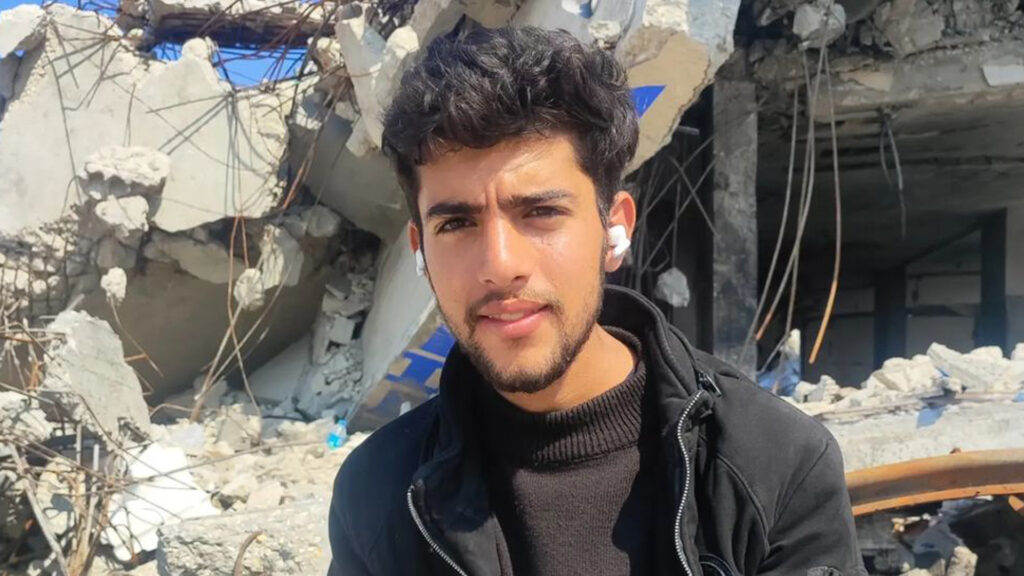
NewsFeed A 20-year-old Palestinian man who was confined to a hospital bed and connected to an IV drip burned to death after an Israeli strike on a Gaza hospital courtyard where displaced people had been seeking shelter. Here’s what we know about Shaaban al-Dalou. Published On 15 Oct 202415 Oct 2024 Adblock test (Why?)
US threatens Israel but deploys troops, revealing policy inconsistency
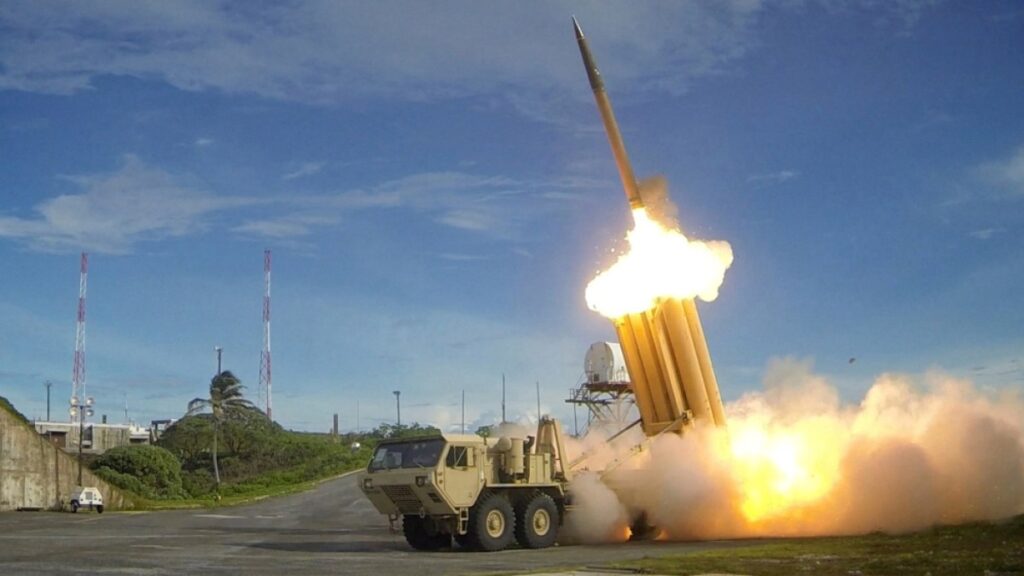
The deployment of an advanced United States anti-missile system to Israel, along with 100 troops to operate it, marks a significant escalation in US entanglement with a widening Israeli war that Washington has already heavily subsidised. But the deployment – in anticipation of an Iranian response to an expected Israeli attack on Iran – also raises questions about the legality of US involvement at a time when the administration of US President Joe Biden is facing growing backlash over its unwavering support for Israel. It also comes as US officials are seeking to project authority and threatening to at last enforce US law prohibiting military aid to countries that block humanitarian aid, as Israel has regularly done in Gaza. Two recent developments — the Sunday announcement that the US would deploy troops to Israel and a letter sent by US officials the same day calling on Israel to improve the humanitarian situation in Gaza or face unspecified consequences — underscore the inconsistent approach of an administration that has effectively done little of substance to rein in Israel’s ever-widening war. At a press briefing on Tuesday, State Department spokesman Matthew Miller declined to say what the consequences of Israel failing to comply with US requests would be, or how this differs from an earlier, unfulfilled threat by the Biden administration to withhold military aid to Israel. “I’m not gonna speak to that today,” Miller told reporters when pressed for details of how the US would respond to Israel’s failure to comply. Empty threats In the private letter, which was leaked on Tuesday, US Secretary of State Antony Blinken and Secretary of Defense Lloyd Austin called on Israeli Defence Minister Yoav Gallant and Minister of Strategic Affairs Ron Dermer to implement a series of “concrete measures”, with a 30-day deadline, to reverse the deteriorating humanitarian situation in Gaza. The US briefly paused the delivery of thousands of bombs to Israel earlier this year as Israeli officials planned to expand their operations in southern Gaza, but it quickly resumed and continued supplying Israel with weapons even as it escalated its assault in Gaza and later in Lebanon. “A letter jointly signed by both the secretary of state and secretary of defence indicates a heightened level of concern, and the not-so-subtle threat here, whether the administration carries through with it or not, is that they will actually impose consequences under these various legal and policy standards,” Brian Finucane, a former legal adviser to the US State Department and senior adviser with the US programme at the International Crisis Group, told Al Jazeera. Whether the administration would carry through with it remained very much in question. “It’s important to note that there were legal standards during the entire course of this conflict, and the Biden administration has just not enforced them. It may be the situation is so dire in northern Gaza that the political calculations have changed, and that they may actually finally decide to implement US law. But it’s really long past the point at which they should have done so,” Finucane said. Finucane also noted that the 30-day deadline would expire after the US presidential election next month. “So they may feel that whatever political constraints the administration may have felt it was operating under, they may feel less constrained by,” he said. Miller, the State Department spokesman, told reporters on Tuesday that the election was “not a factor at all” — but Annelle Sheline, a former State Department official who resigned earlier this year in protest of the administration’s Israel policy, disagrees. “I interpret it as being intended to try to win over Uncommitted [National Movement] voters and others in swing states who have made clear that they are opposed to this administration’s unconditional support for Israel,” Sheline told Al Jazeera. “I do not expect to see consequences.” Deeper entanglement Whether the US would carry through with its threats, the deployment of troops to Israel sent a much more concrete message of ongoing US support no matter how dire the humanitarian situation. The US-made Terminal High Altitude Area Defense system, or THAAD, an advanced missile defence system that uses a combination of radar and interceptors to thwart short, medium and intermediate-range ballistic missiles, adds to Israel’s already extraordinary anti-missile defences as it weighs its response to an Iranian missile attack earlier this month. Biden said its deployment is meant “to defend Israel”. The announcement of the deployment came just as Iranian officials warned that the US was putting the lives of its troops “at risk by deploying them to operate US missile systems in Israel”. “While we have made tremendous efforts in recent days to contain an all-out war in our region, I say it clearly that we have no red lines in defending our people and interests,” Iran’s Foreign Minister Abbas Aragchi wrote in a statement on Sunday. In practice, the deployment further drives the US into war at a time when US officials continue to pay lip service to diplomacy. “Rather than force de-escalation or act to rein in Israeli officials, President Biden is redoubling efforts to reassure Israeli leaders that he is in lockstep with them as they deliberately barrel towards regional war and escalate a genocidal campaign against Palestinians,” Brad Parker, a lawyer and associate director of policy at the Center for Constitutional Rights, told Al Jazeera. Parker and other lawyers argue that the Biden administration is relying on narrow and stretched legal arguments in an attempt to justify a seemingly unilateral move under US law. The US is also already implicated under international humanitarian law for the support it has given Israel as it violated the laws of war. “So far, the Biden administration has tried to characterise the fortification of existing deployments and authorisation of new deployments as fragmented or individual incidents. However, what emerges is a comprehensive and robust introduction of US forces into situations where involvement in hostilities is imminent without any congressional authorisation as required by the law,” Parker said. “All
Laredo enters its sixth day of a boil-water notice after E. coli is discovered in water system

The South Texas city is the latest to grapple with aging water infrastructure, which officials suggested could have been the cause for the E. coli outbreak.
Local officials face off against Georgia’s elections board over rule that could shake up November

A hearing was held Tuesday in a key Georgia county’s lawsuit against the State Elections Board (SEB), roughly three weeks until voters head to the polls on Nov. 5. Fulton County Superior Court Judge Robert McBurney is overseeing the case filed by the Cobb County Board of Elections earlier this month. The bipartisan board is taking issue with a set of new rules imposed by the SEB, including a measure to require county election workers to hand count ballots after polls close to ensure accurate machine tabulation. The rule has also sparked a lawsuit filed by Georgia Democratic officials, which is set for a hearing on Wednesday. Cobb County is a majority suburban area anchored by the city of Marietta, a suburb of Atlanta. GEORGIA GOP CHAIR SHARES 2-PRONGED ELECTION STRATEGY AS TRUMP WORKS TO WIN BACK PEACH STATE During the Tuesday hearing, attorneys for the SEB argued that there were no limitations on when election rules can be passed and pointed out that the specific hand-counting rule applies only to the ballots themselves, not tallying individual votes cast on the ballots. “All we are doing is saying, you need to [have] receipts of votes cast, mirror the number that the machine says were cast,” the lawyer said. But McBurney noted that it was “late in the game” for the SEB to change election rules but also conceded that, in a vacuum, wanting to ensure that the number of ballots cast matched the machine-count was a “laudable goal.” GEORGIA DEMS CHAIR REVEALS MESSAGE TO UNDECIDED GOP VOTERS AS HARRIS WORKS TO BUILD BROAD BASE “Why wouldn’t we just pause, especially on the hand-count rule, given what looks like a fairly robust record of chaos that it is sowing?” the judge asked the defendants’ lawyer. “I’m asking you from a practical perspective, if the goal is orderly, reliable elections, why the prudent — in terms of reasonableness approach — wouldn’t be to say, ‘Let’s try this next election,’ when all those questions can be answered with no one having to sue?” Republican Party officials have held the rule up as a critical guardrail to ensuring voters can be confident in their elections, but Democrats contend that its goal is to foment doubt in the process. The Cobb County lawsuit argued the rules put elections boards across the state in “an untenable position.” An attorney in support of the plaintiffs later pointed out the state officials who have come out in opposition to the rules changes, including Republican Secretary of State Brad Raffensperger. “All of them are concerned about the impact of this rule,” the lawyer said. TRUMP VS HARRIS ROUND 2? VOTERS IN KEY GA COUNTY REVEAL IF THEY WANT SECOND DEBATE “It would be one thing in an ideal sterile environment to have people who are fresh and energized sit down and count ballots… That’s not how this is going to play out. In reality, as our petitioner affidavits reference, poll workers get to their polls as early as 5 a.m., 5:30, 6 a.m. They stay as late as 8 p.m., 10 p.m. And so we’re talking about adding something on top of an already 14- to 16-hour day when people are exhausted.” McBurney pointed out that it could then be done the next day, to which the attorney responded, “But then there are challenges that come with that as well, Your Honor.” The judge said the hand-counting ballots rule “does not directly interfere with the certification work going on” but that it “will be a resource drain, no question.” But the SEB attorney later criticized the plaintiffs’ arguments as conjecture. “All that it says over and over again is, quote, ‘I am concerned about the rule’s last minute adoption….I am concerned that the Cobb County Elections Office lacks space. I am concerned that the hand-count rule may lead to delays,” he said. “It is hypothetical on top of conjecture, on top of speculation. There is no imminent threat here. There is a threat of potential things that might happen if the worst-case scenario comes up, and that’s simply not sufficient for declaratory judgment.” McBurney heard the case the same day as he issued a decision in a separate Georgia elections case, ruling that county elections supervisors are not allowed to delay certification of results on the grounds of their own suspicions of fraud or mistakes. There are a flurry of lawsuits expected around the vote count and voter access this election, as there are virtually every presidential election cycle. Get the latest updates from the 2024 campaign trail, exclusive interviews and more at our Fox News Digital election hub.
Fox News Politics: Nathan Wade grilled

Welcome to the Fox News’ Politics newsletter, with the latest political news from Washington, D.C. and updates from the 2024 campaign trail. Here’s what’s happening… -Trump says ‘I don’t care when you vote’ in new House GOP ad urging voters to turn out early -Top outside group backing Senate Republicans showcases fundraising haul -Harris holds big advantage among early voters, Trump with Election Day voters: poll Former Fulton County Special Prosecutor Nathan Wade left Capitol Hill on Tuesday after a marathon four-and-a-half hour grilling by House Judiciary Committee investigators. Wade, whose legal team included former Georgia Gov. Roy Barnes, said little to reporters before, after and during his closed-door deposition. No lawmakers were seen entering or leaving the room. “This is all I’m going to say – we gave our testimony, we cooperated and we are through,” Barnes told reporters after the session…Read more MICROMANAGER-IN-CHIEF?: Netanyahu states that his regime, not the US, will decide how to retaliate against Iran…Read more CHECK THE TAPE: Speaker Johnson accuses CBS of ‘selectively editing’ interview on heels of VP Harris ’60 Minutes’ controversy…Read more ‘I’M PRAYERFUL’: Nancy Pelosi admits she still hasn’t spoken to President Biden after pressuring him to drop out of the race…Read more ‘BIGGEST CHALLENGE’: The biggest challenge right now is fuel’: Rep. Greg Steube of Florida talks hurricane aftermath…Read more WHO’S MORE ACCESSIBLE?: Trump-Vance ticket has done combined 78 interviews since August compared to 42 for Harris-Walz…Read more BLUE ALERT: Popular PA Democratic mayor warns Trump is ‘out-messaging’ Harris: ‘I get more from Colbert’…Read more ‘PARTY OF COMMON SENSE’: Trump says GOP is ‘party of common sense’ during contentious Bloomberg interview…Read more BIDENS ON THE TRAIL: President and first lady campaign in the biggest of the battlegrounds…Read more EV TROUBLES: Harris support for EVs could tank campaign in critical swing state, expert says…Read more ‘AT LEAST AFFORD GROCERIES’: ‘I was much better off’: These voters back Trump in top battleground county…Read more CHARGED UP: ‘Ruining our car industry’: Biden-Harris EV regs prove flashpoint in Michigan Senate debate…Read more CUT SHORT: Trump cuts Pennsylvania town hall short over medical emergencies in crowd…Read more SPARKS FLY: CNN anchor and Rep. Waltz clash over Harris ‘socialist’ label, networks likening Trump to Hitler…Read more ‘THIS IS THE PRICE OF LAWFARE’: Classified docs case dismissal means ‘greatest’ legal ‘threat’ to Trump is ‘gone’…Read more MORE THAN A ‘HANDFUL?’: New report warns bloodthirsty Venezuelan gang’s footprint will remain in US ‘for decades’…Read more JUDGE RULES: Georgia judge rules election officials must certify vote counts, even if they suspect fraud…Read more ‘COLLECTIVE FAILURE’: Outlet deletes review of Oct. 7 doc after backlash for complaining that film depicts Hamas too negatively…Read more ANTISEMITISM ON CAMPUS: Hamilton College student admits to posting ‘antisemitic remarks’ on campus, New York State Police say…Read more Get the latest updates from the 2024 campaign trail, exclusive interviews and more on FoxNews.com.
From cease-fire push to boots on the ground in Israel: US seemingly accepts involvement in escalating war
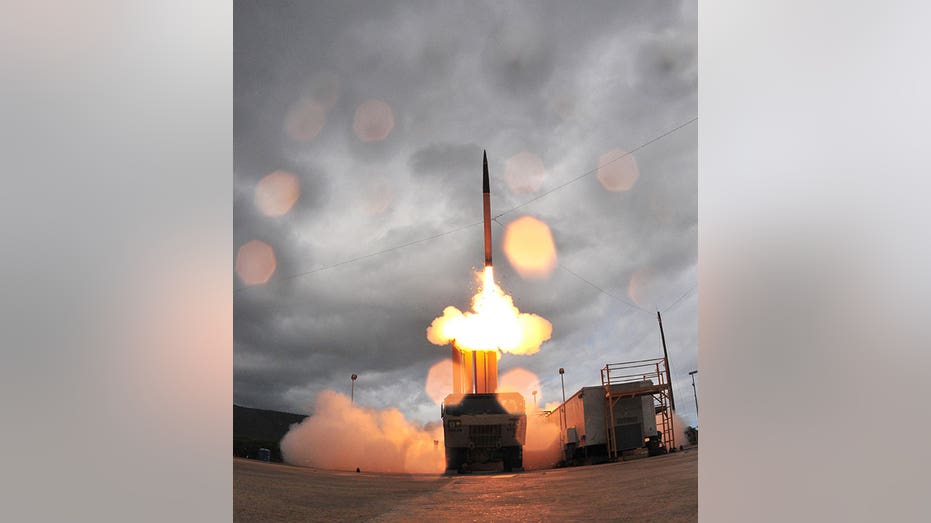
The U.S. is now more deeply entrenched in the conflict in the Middle East after a pivotal move to send troops to Israel was announced this week. On Monday, the Biden administration revealed it would offer Israel one of the U.S.’s highly sophisticated THAAD missile defense systems – as Israel braces for potential Iranian retaliation to the counter-attack it is planning after Tehran rained down missiles on Tel Aviv on Oct. 1. Only U.S. troops can operate the system, and 100 of them will deploy to Israel. The Pentagon only has seven operable Terminal High-Altitude Area Defense (THAAD) batteries in its possession, and the one offered to Israel would presumably be among the seven. Though Washington has armed Israel throughout its existence, putting boots on the ground for Israel’s defense is a rare departure from U.S. policy and the first U.S. deployment there since the outbreak of war after the Oct. 7 Hamas attack. “It’s a bit unprecedented,” said EJ Kimpton, policy director at the U.S. Israel Education Association. “Israel’s mantra has been, you know, with ‘Never Again,’ meaning we will defend ourselves by ourselves, obviously working with allies, but that we should be able to defend our country and not be dependent upon others,” Kimpton went on. “It changes the dynamic between the U.S. and Israel in Israel’s war fighting over the years.” “This would be the first time that U.S. personnel would be actively engaged in essentially fighting a war with Israel if Iran were to carry out additional strikes.” NETANYAHU HITS BIDEN ADMIN, SAYS ISRAEL – NOT US – WILL DECIDE HOW TO HANDLE IRAN From pushing Israel to a cease-fire, the U.S. has pivoted to containing the war in the Middle East, to seemingly accepting the fate of U.S. involvement in the conflict. The U.S. has some 43,000 troops deployed elsewhere in the Middle East and recently sent a “few thousand” to the region within the last few weeks to be ready to defend Israel if necessary. “It’s inescapable to see it as anything else [than escalation], the United States is now actually sending troops. We did not do that in Ukraine,” Trita Parsi, vice president of the Quincy Institute for Responsible Statecraft, told Fox News Digital. Sending U.S. troops to Ukraine is a non-starter in American discourse – a popular refrain among supporters is that such aid will prevent U.S. troops from ever having to put themselves in Russia’s line of fire. “We may end up having American casualties, and to put soldiers in that type of vulnerable situation for something that is not the defense of the United States itself, I think, is a very serious step taken by the administration,” said Parsi. In the past, Iranians have targeted military installations, including Israeli air defense systems. The THAAD system is expected to be able to intercept ballistic missiles launched from Iran and Yemen and shoot down any short-range missiles launched by Hezbollah from Lebanon. Others question why the administration is supplying the system with no real off-ramp to the conflict or U.S. involvement in it. Israel’s mission to eradicate Hezbollah and Hamas has now drawn it into direct conflict with Iran, and hope for peace anytime soon appears to have faded. “Why are we keeping U.S. troops in harm’s way in Iraq and Syria with no clear mission or defensive strategy, while deploying critical defense systems like THAAD to Israel?” Jason Beardsley, senior coalitions adviser to Concerned Veterans for America, questioned. “The reality is, we’re funding both sides of this conflict – directly aiding Iraq, whose Iranian-backed militias target our forces, and indirectly supporting Israel’s defense without addressing the real vulnerability: U.S. personnel scattered across the Middle East, with Iran’s proxies actively targeting our troops.” IDF MEETS LITTLE RESISTANCE FROM HEZBOLLAH AFTER WEEKS OF HITTING TERROR TARGETS, OFFICIALS SAY The U.S. has some 2,500 troops in Iraq leading a coalition that provides extensive support to the Iraqi Security Forces to fight ISIS. But Iran has already tightened its grip on Baghdad and the mission its forces carry out. The THAAD will assist Israel’s other missile defenses in what could be the Biden administration bracing for escalation: an aggressive counter-attack from Iran to an aggressive counter-attack from Israel. For two weeks, the world has waited to see how Israel responds to the 200 missiles Iran fired at the heart of Tel Aviv. A violent showing from Israel might deter Iran from wanting to pick a larger battle. But in the Biden administration’s view, a disproportionate response risks a tit-for-tat that could lead to all-out war. President Biden may have offered the system as a way to coax Prime Minister Benjamin Netanyahu to follow his recommendation: to make sure Israel’s counterstrike to Iran’s missile attacks is “proportional” – by going after military installations – not nuclear or oil facilities. “I think the administration may be thinking that by offering this, they can convince the Israelis not to go that far,” said Parsi. “If you truly want to put an end to this, then sending the same system that actually makes it easier for Israel to escalate is not the answer… Sometimes, it’s really difficult to discern who is actually making the policy and what is the policy.” Netanyahu told Biden he was willing to strike military facilities when they spoke on the phone last week, according to a Washington Post report. But after that report, Netanyahu said in a statement he would not be making any decisions based on Biden’s insistence on proportionality. “We listen to the opinions of the United States, but we will make our final decisions based on our national interest.”
Afghan ISIS terror plot: Biden admin agencies point fingers as lawmakers demand answers
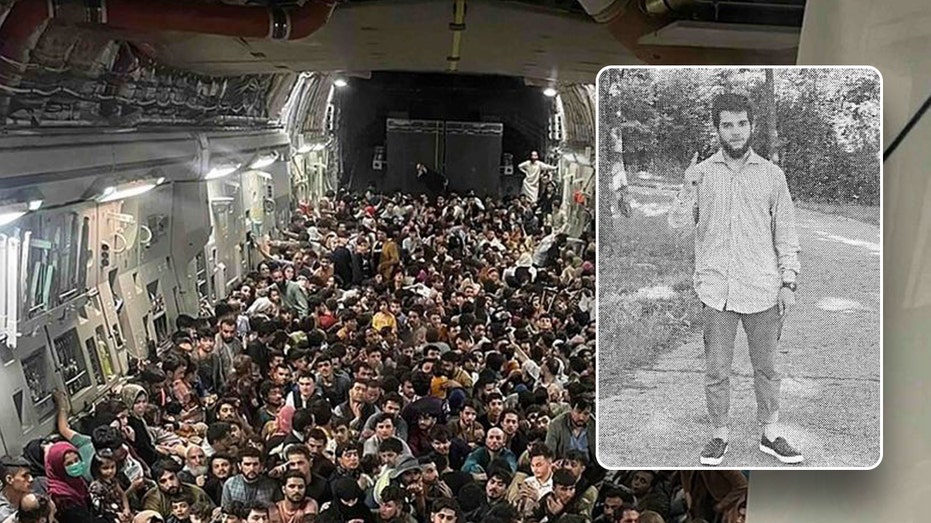
Government agencies are pointing fingers over how an Afghan national, who is now charged with plotting an Election Day terror attack, was allowed into the U.S. and when he was allegedly radicalized — as lawmakers are pushing for more information. Authorities last week announced the arrest of Nasir Ahmad Tawhedi, who is accused of plotting an Election Day terror attack inspired by ISIS. Tawhedi is charged with conspiring and attempting to provide material support to ISIS and receiving a firearm to be used to commit a felony or a federal crime of terrorism. Court documents say he liquidated his family’s assets to finance his plan, including purchasing rifles and one-way tickets for his wife and child back to Afghanistan. AFGHAN CHARGED WITH ELECTION DAY TERROR PLOT RAISES QUESTIONS, FEARS FROM LAWMAKERS: ‘THIS IS REAL’ ’ Tawhedi came to the U.S. in Sept. 2021 amid a mass evacuation effort as the Taliban took back Afghanistan. The U.S. would go on to admit more than 97,000 Afghan evacuees, of which about 77,000 were admitted via humanitarian parole. Court filings initially stated that he came on a special immigrant visa but have since clarified that he came to the U.S. via humanitarian parole and later applied for SIV status. Parole requires a less intense vetting than the SIV process. DHS Secretary Alejandro Mayorkas initially refused to answer questions at a White House briefing last week. But a senior administration official told Fox News that Tawhedi was screened three times. He was screened first to work security for the CIA in Afghanistan, then for humanitarian parole to enter the U.S. in 2021, when he was vetted and screened in a third country, and then for special immigrant status, for which he was approved. His status has not yet been finalized. Officials said they believe he was radicalized after coming to the U.S. and that there was no indication that there were any red flags to bar his entry. But then the government blame game began on the question of when he was radicalized. Fox News is told that the FBI is still putting together specifically when he was radicalized, and if he fell through the cracks. “The Department of Homeland Security is directly contradicting the State Department in terms of who vetted who,” Rep. Michael Waltz, R-Fla., told Fox News. “I think all of us involved know that the vetting wasn’t as it should have been. They got out a lot of the wrong people and left behind the right people.” DHS said it did everything by the book. MAYORKAS REFUSES TO ANSWER QUESTIONS ON AFGHAN ACCUSED OF ELECTION DAY TERROR PLOT “When we vet and we do so intensively when we vet an individual, it’s a point-in-time screening and vetting process. If we obtain information subsequently that suggests the individual could be of danger, we take appropriate law enforcement action. That is exactly what we did in this case,” DHS Secretary Alejandro Mayorkas said this weekend on CBS News. When asked about his radicalization, Mayorkas said he wouldn’t speak to that as it was an “ongoing investigation.” Fox News reported on Monday that two Oklahoma senators had received briefings from the DOJ but Rep. Stephanie Bice has not and has complained about a lack of information. Tawhedi was arrested in Oklahoma. After the briefing, both senators expressed concern that another attack could be looming. AFGHAN NATIONAL CHARGED WITH ELECTION DAY TERROR PLOT REIGNITES VETTING CONCERNS “There was a vulnerability that was left that was able to be taken advantage of by, in this case, ISIS. It could be Taliban next time. It could be any other terrorist organization out there. And what I fear… is this is just one of probably tens, I wouldn’t say hundreds, but tens of more individuals that are in the same situation,” Sen. Markwayne Mullin, R-Okla., told Fox News. “This is real. And we have people that are trying to be able to kill us that are within our own country, they’re planning,” Sen. James Lankford, R-Okla., told Fox News. “An open border is a danger. We’ve seen that already, that we’re living on borrowed time through this moment.” Fox News’ Chad Pergram and Jacqui Heinrich contributed to this report.
Biden-Harris admin warns Israel over Gaza humanitarian aid, leaked letter reveals
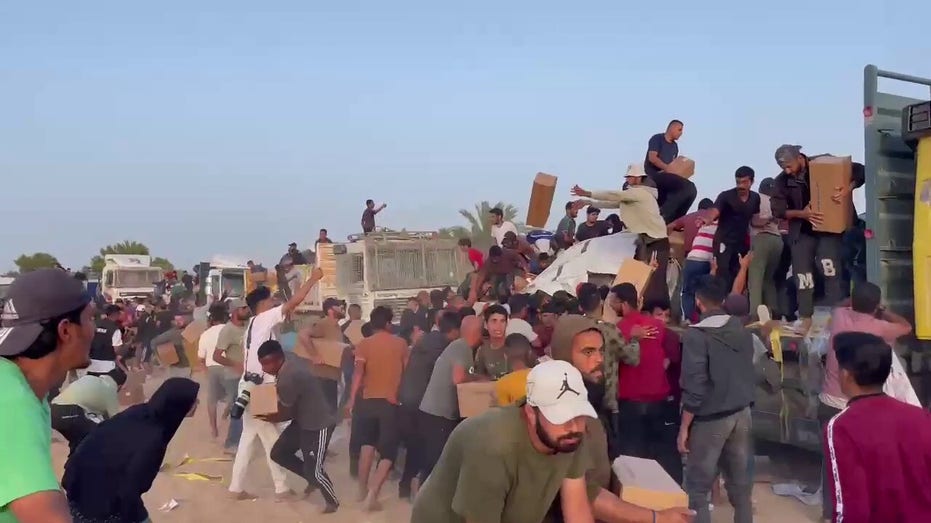
U.S. Secretary of State Antony Blinken and Secretary of Defense Lloyd Austin sent a letter to Israel demanding it improve the humanitarian situation in Gaza or risk losing crucial security assistance. The letter was supposed to be a private, diplomatic communication and was not intended for the public, State Department spokesperson Matt Miller said at a press conference Tuesday. “What we have seen over the past few months is that the level of humanitarian assistance has not been sustained,” adding, “Ultimately, we did not see our concerns sufficiently addressed, which is why the two secretaries sent the letter they did,” Miller warned. ISRAELI MILITARY KILLS 250 HEZBOLLAH TERRORISTS SINCE START OF LIMITED GROUND OPERATION IN LEBANON National Security Council spokesperson John Kirby tried to assuage fears and told reporters that the letter was not meant as a threat. “The letter was simply meant to reiterate the sense of urgency we feel and the seriousness with which we feel about the need for an increase, dramatic increase in humanitarian assistance. And that’s what you can do with your friend. That’s what you can do with your ally. And it’s not the first time we’ve communicated that to Israel. But hopefully we won’t have to communicate it again.” Some critics took issue with the letter not being a threat. “I’m not sure which is worse to consider, that threatening an ally is a necessary pre-election political theater to pacify radical pro-Hamas leftists or that it’s actually U.S. policy to cut off arms to Israel if Israel doesn’t agree to feed, fuel and fund Hamas,” Richard Goldberg, a senior adviser at the Foundation for Defense of Democracies and former NSC official in the Trump administration, told Fox News Digital. “Because let’s be clear, that’s what this is really all about – whether Hamas survives by controlling humanitarian aid and its distribution,” Goldberg said. The letter, which was first obtained by Axios, expressed its “deep concern over the deteriorating humanitarian situation in Gaza” and is particularly concerned that recent actions by the Israeli government, including halting commercial imports and denying or impeding nearly 90% of humanitarian movements between northern and southern Gaza in September, are “contributing to an accelerated deterioration in the conditions in Gaza.” YAZIDI WOMAN HELD HOSTAGE FOR 10 YEARS IN GAZA RESCUED IN ISRAEL, US OPERATION Since assurances made by Israel last spring, which the letter acknowledges produced important improvements in the humanitarian situation, the amount of aid delivered to Gaza has dropped by 50% in September, the lowest amount of aid delivered in any month since the war began. The letter says Israel has within 30 days to “reverse the downward humanitarian trajectory” and remain consistent with its obligations to the U.S. Failure to comply with these demands, the letter said, would violate existing U.S. law and have serious implications for U.S. national security policy. Israel has defended its humanitarian response to the crisis in Gaza in a statement released on Monday by COGAT, the army division that deals with aid to Gaza, stating, “Since the start of the war, Israel has allowed the international community to bring 54,270 aid trucks into Gaza, carrying 1,064,820 tons of humanitarian aid through various crossings, including 38,746 trucks carrying approximately 824,078 tons of food.” KIRBY: ‘NO USE IN RESPONDING’ TO A ‘HANDFUL OF VETS’ ON BIDEN’S BOTCHED AFGHAN WITHDRAWAL The U.S. must continually assess the delivery of humanitarian aid under the Foreign Assistance Act in order to provide foreign military financing assistance to Israel. President Biden issued a memorandum in February stating countries receiving U.S. weapons must adhere to international humanitarian law and provide written assurances of their compliance under the laws of war. The U.S. has surged billions of dollars in security aid to Israel since the Hamas terrorist attack on Oct. 7, 2023. Israel is also the largest recipient of U.S. foreign aid since its founding and has received around $310 billion in economic and military aid. On average, the U.S. provides Israel with over $3 billion in security assistance a year. NETANYAHU HITS BIDEN ADMIN, SAYS ISRAEL – NOT US – WILL DECIDE HOW TO HANDLE IRAN A major component of security aid includes $500 million a year for joint U.S.-Israeli missile defense programs, notably the Iron Dome, David’s Sling and Arrow II, which have been critical to thwarting rocket and missile attacks from Hamas, Hezbollah and Iran since Oct. 7. Some of the military aid to Israel since Oct. 7 includes 13,981 120mm M830A1 high-explosive anti-tank multi-purpose with tracer (MPAT) tank cartridges, 500 aircraft deliveries and 107 sea shipments to Israel of over 50,000 tons of munitions and weapons systems, according to the Congressional Research Service. The U.S. also announced that it would be sending military personnel and initial components necessary to operate the Terminal High-Altitude Area Defense (THAAD) battery to Israel to bolster the country’s security. “The deployment of the THAAD battery to Israel underscores the United States’ commitment to the defense of Israel and to defend Americans in Israel from any ballistic missile attacks by Iran,” the Pentagon press secretary, Maj. Gen. Pat Ryder, said in a statement. According to the Hamas-run Gaza Ministry of Health, over 40,000 people have been killed since the start of hostilities following the terror group’s massacre of Israelis last October. Some 1,200 Israelis were massacred and 257 were kidnapped and held hostage by Hamas in Gaza. All of Gaza’s 2.1 million people are in need of urgent humanitarian assistance and 1.9 million people are internally displaced, according to the International Rescue Committee.
Texas rejects insurance rate increase for coastal homeowners, businesses
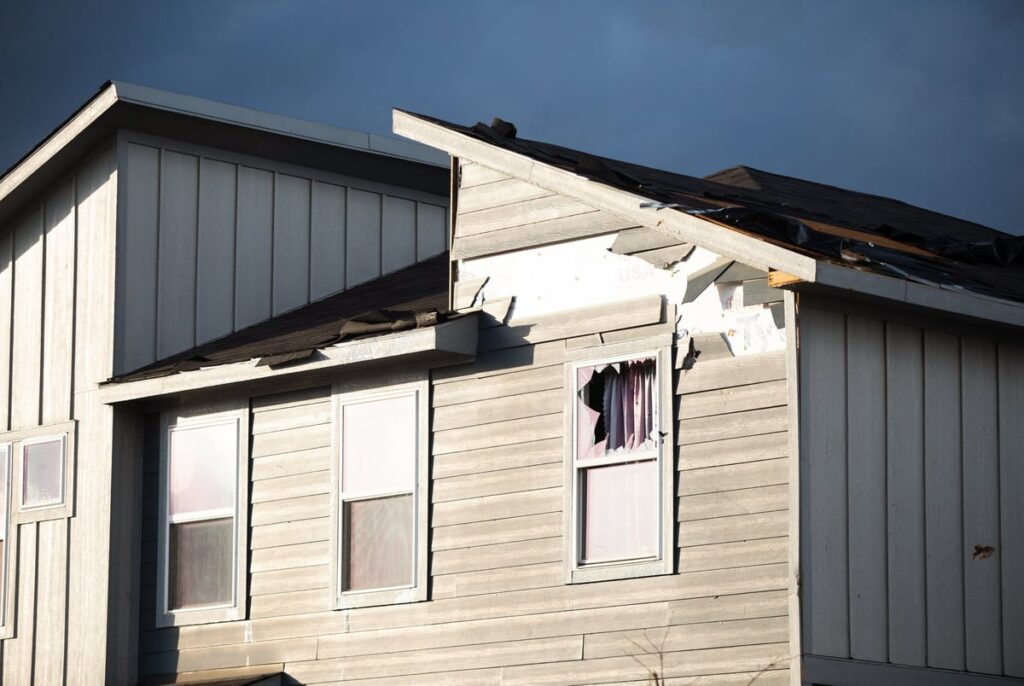
Texas Windstorm Insurance Association officials argued they needed a 10% rate increase to help insure a growing number of policyholders.
